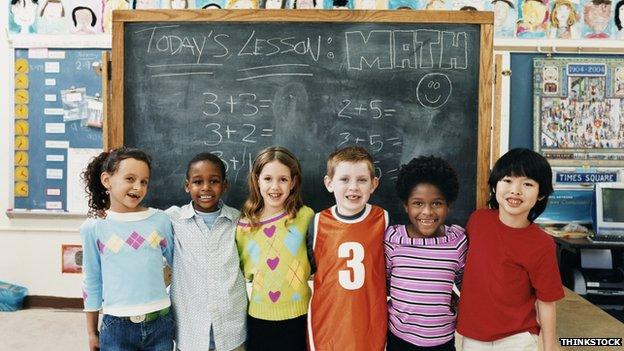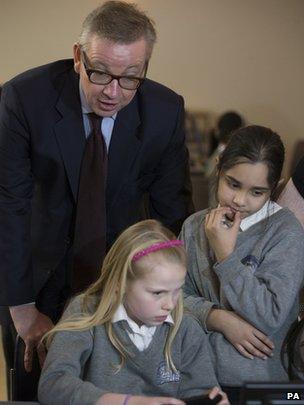What's the point of school?
- Published
- comments

For as long as there have been schools, people have been asking what is the point of them. Quite a lot of pupils have asked that question, of course. But some notable grown-ups have pondered the matter, too.
In 1947, Dr Martin Luther King gave a lecture entitled The Purpose of Education in which he told his audience that the goal of true education was, "intelligence plus character".
Now comes a report from the all-party parliamentary group (APPG) on social mobility making a similar argument - that along with history and maths, teaching 'character and resilience' should be an essential part of every school's ambition.
The idea that schools should teach the skills to "take command" of yourself, as the American philosopher John Dewey put it, has a long history and still commands widespread support.
Even though our education system is designed and assessed upon its ability to get lots of children through state exams, very few people seriously argue that the fundamental point of schools is ensuring pupils pass tests.
We ascribe to schools a loftier ambition than academic success alone. We want them to prepare our children for adulthood and provide them with the skills to have the most fruitful and fulfilling life possible. Don't we?

Eton aims for the "all-rounded person"
Well, according to the Character and Resilience Manifesto published by the APPG today, "while teachers felt that building character should be a central aspect of their role, they did not see this as a core element of their school's strategy."
"All too often the development of attributes associated with character and resilience - that is, the development of the pupil as a rounded individual - are neglected or, at best, given second billing," the report laments. "The very language used is illustrative - they are 'soft' skills developed through 'extra' - curricular activities."
There is, actually, a surprising amount of agreement on these ideas. Progressive educationalists tend to call it "emotional intelligence" or "emotional health", while conservatives prefer words like "character" and "backbone", but it amounts to pretty much the same thing.
At an event last year to launch the APPG's work on character and resilience, the headmaster of Eton, Tony Little, said his school's fundamental mission was to create the "all-rounded person", able to stand up for themselves. Building character was at the heart of the school's ethos, he said.

Michael Gove has lauded a programme in the US that values character development
Britain's top public schools trade on their reputation for moulding self-confident and resilient individuals as much as exam results. And with good reason.
Last October, an LSE report, asking What Predicts a Successful Life, noted, "The most powerful childhood predictor of adult life-satisfaction is the child's emotional health. Next comes the child's conduct. The least powerful predictor is the child's intellectual development."
The APPG report wants the same ambition Eton has for creating the "all-rounded person" embedded in state schools. It recommends the introduction of an official 'School Leaving Certificate' that might "explicitly break down and reference particular character and resilience competencies".
The trouble with all this is a lack of hard evidence of what works in the classroom, or as the LSE work in this area puts it, "many well-intentioned programmes carried out with the best will in the world have been found to make no difference".
A scheme called "Social and Emotional Aspects of Learning" (SEAL) was introduced to most English primary and secondary schools in 2006. It had been sold as "a comprehensive, whole-school approach" to promoting social and emotional skills. Unfortunately, an evaluation concluded the programme "does not appear to have impacted upon any of the pupil level outcome measures".
The APPG report recognises the weakness in the UK evidence base but points to successful initiatives in Singapore and the United States. The American "Knowledge is Power Program' (KIPP) is cited as a model of what is possible.
Based partly on work by US psychologist Dr Martin Seligman, linking self-discipline with achievement at school, KIPP values character development as highly as academic preparation. It has had remarkable success with youngsters from some of America's most deprived neighbourhoods.
Based on seven "highly predictive" strengths - zest, self-control, gratitude, curiosity, optimism, grit and social intelligence - the KIPP model is now being adapted in some UK schools.
The Knowledge is Power Programme has even been lauded by England's Education Secretary Michael Gove - he said it had "dramatically narrowed the vast performance gap between black and white children" in New York.
There is no shortage of enthusiasm for the idea that schools should offer grit and zest along with maths and history. But somehow implementation tends to fall down. The failures of SEAL were partly put down to a lack of "will and skill", the evaluation concluded.
It seems our schools need to find the self-confidence and determination to push ahead with an idea that goes back decades. They need to show a bit of "character and resilience".